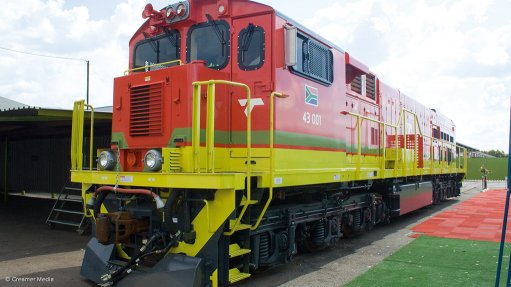
EDUCATION DRIVER Transnet Engineering is passionate about the learning and development of youth and is continuously investing in its technical skills pipeline
Photo by: Duane Daws
State-owned freight and logistics group Transnet Engineering says its membership and association with nonprofit technical organisation the Southern African Institute of Welding (SAIW), has ensured that all Transnet Engineering’s welding inspectors have been correctly trained and certified to provide a high-quality service offering.
“We often consult with SAIW experts to assist in solving welding-related challenges,” Transnet Engineering welding engineer Naeema Kharsany tells Engineer-ing News.
She adds that SAIW was contracted in July to implement and conduct the ISO 3834:2005 certification for Transnet Engineering, which is the quality standard for fusion welding.
“The SAIW is also implementing EN 15085 at our operations, which is the standard for railway welding and facilitating certification. The SAIW is facilitating the certification process through its association with the international scientific and engineering body the International Institute of Welding,” Kharsany explains.
She emphasises that the SAIW’s involvement in certifying Transnet Engineering personnel to meet international requirements, such as those for international welding engineers, international welding technologists and international welding specialist criteria requirements, is critically important for Transnet Engineering to reach its goal of being an internationally accredited manufacturer of railway rolling stock.
Moreover, Kharsany highlights that Transnet Engineering is South Africa’s largest railway manufacturer.
“We are responsible for manufacturing coaches, wagons and locomotives for the railway industry in South Africa and internationally. Transnet Engineering is working on the largest consignment of locomotives in South African history for its sister company Transnet Freight Rail,” she notes.
In March, Transnet announced it had awarded a R50-billion contract for the building of 1 064 locomotives to four global original-equipment manufacturers (OEMs).
These OEMs include Chinese State-owned locomotive and rolling stock manufacturer China South Rail Zhuzhou Electric Locomotive, and rail technology manufacturer Bombardier Transportation South Africa, which will jointly supply 599 electric locomotives. Electric services and capital company General Electric (GE) South Africa Technologies, and Chinese State-owned locomotive and rolling stock manufacturer China North Rail Rolling Stock South Africa will collectively build and supply 465 diesel locomotives.
This project forms part of Transnet’s Market Demand Strategy (MDS), which aims to meet local rolling stock requirements and is scheduled for completion by the end of 2018.
Further, Kharsany points out that TFR’s six business units – agriculture and bulk liquids, coal, intermodal (container) and automotive, iron-ore and manganese, mineral mining and chrome, as well as steel and cement – are building a variety of wagons and coaches for local customers, neighbouring countries and international customers.
Educational Emphasis
Transnet Engineering School of Engineering (SoE) head Dumisani Kala highlights that Transnet Engineering is “passionate” about the learning and development of youth and is continuously investing in its technical pipeline to support Transnet’s MDS, the National Development Plan and the National Skills Accord.
The SoE, which was established in November 2007, also has a large private client base in South Africa and the Southern African Development Community region, including Zambia, Zimbabwe, Swaziland, Botswana and Mozambique.
Kala says there are currently 3 100 apprentices in various phases of their learning in Transnet Engineering’s technical pipeline, with 16% of the apprentices being welders. He adds that as soon as the apprentices qualify and exit from the SoE, Transnet absorbs the graduates by permanently appointing them as artisans, based on business affordability.
He says the graduates it cannot employ are “released to the market”.
Further, Transnet Engineering entered into a partnership with the Department of Higher Education and Training (DHET), in October 2013 to train apprentices through the National Skills Fund, which allocated R175-million to the SoE.
“The funding has been used to buy new machines and the latest technology that complies with international standards,” Kala states.
The machines that have been bought for welding purposes, include a carbon dioxide welding machine, an arc-inverter welding machine, a manual arc-welding machine, and a plasma arc-welding machine, as well as a tungsten inert gas welding machine and a gouging machine.
He adds that the SoE also has a long history in engineering-related training and is accredited by the Transport Education and Training Authority, the Manufacturing, Engineering and Related Services Sector Education and Training Authority, and the Services Sector Education and Training Authority, besides others.
Further, Kala points out that the SoE has strong partnerships with several OEMs, such as GE, Electro Motive Diesel and several local further education and training institutions and DHET-affiliated institutions in South Africa.
He says the SoE complies with the ISO 9001:2008 standard for quality management systems and the international Occupational Health and Safety Assessment 18001:2007. This standard assists organisations in managing and negating occupational health and safety risks to employees and in improving existing health and safety management systems.